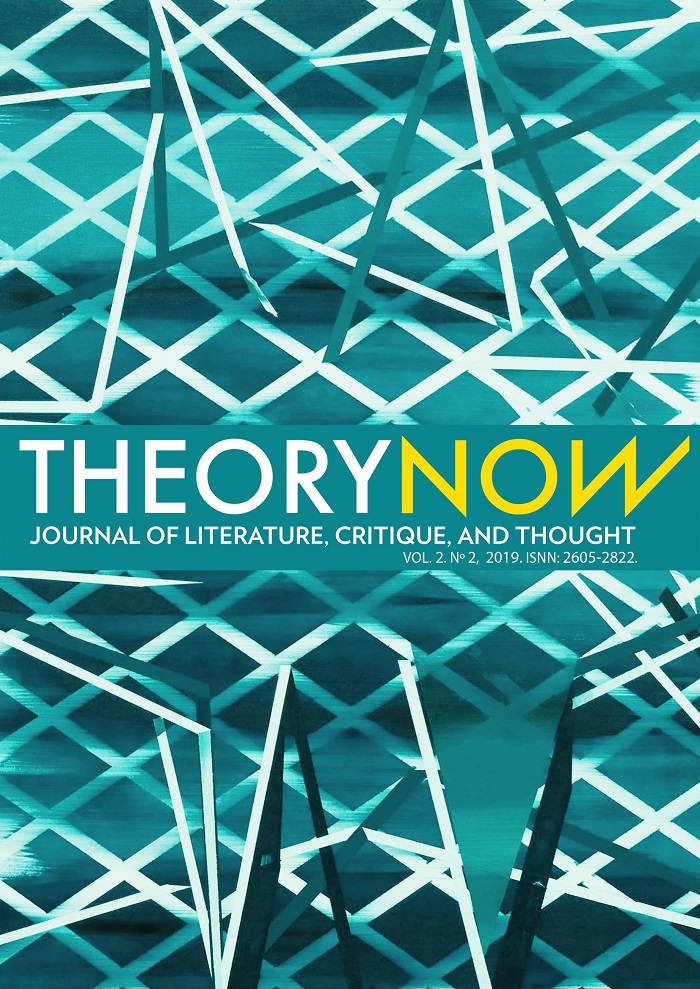La novela neo-histórica: la incursión de David Mitchell en el género por medio de la aventura, el imperialismo y la exotización del pasado
DOI:
https://doi.org/10.30827/tnj.v2i2.9554Palabras clave:
Novela neo-histórica, Romance histórico, David Mitchell, Exotización, The Thousand Autumns of Jacob de ZoetResumen
Este artículo analiza una nueva concepción de la ficción histórica que surgió en la escena literaria británica a comienzos del siglo XXI, y que Elodie Rousselot, entre otros, ha denominado neohistórica, habiéndose desarrollado según principios similares a la ficción neo-victoriana. Esta variedad utiliza el modo narrativo del realismo y participa en la afición popular por el pasado que se manifiesta en diferentes formas de “public history”. El análisis parte de una consideración de las implicaciones de este enfoque crítico y narrativo, en la medida en que transciende sus fundamentos posmodernos y se entrecruza con el género del romance histórico. Este artículo analiza The Thousand Autumns of Jacob de Zoet (2010) de David Mitchell como un ejemplo de este fenómeno a la luz también de la conceptualización que Mitchell hace del género de la ficción histórica. La novela combina un enfoque meta-realista con la exotización del pasado, la exploración de las subjetividades ficticias y una conciencia de preocupaciones post-imperialistas en un mundo globalizado.Descargas
Citas
Beasley, William G. The Japanese Experience. A Short History of Japan. London, Phoenix Press, 1999.
Bergmann, Ina. “The New Historical Fiction: Between Tradition and Innovation”. In Cameron, John ed. Narrative and the Essence of History. Essays on the Historical Novel, John Cameron (ed.). Newcastle upon Tyne, Cambridge Scholars Publishing, 2012.
Boccardi, Mariadele. The Contemporary British Historical Novel. Representation, Nation and Empire. London, Palgrave MacMillan, 2009.
Byatt, Antonia S. On Histories and Stories. Selected Essays. Cambridge, Harvard University Press, 2000.
Danytė, Milda. “National Past / Personal Past. Recent examples of the Historical Novel by Umberto Eco and Antanas Sileika”. Literatūra, vol. 49, no. 5, 2007, pp. 34-41.
Dillon, Sarah. David Mitchell. Critical Essays. Canterbury: Gylphi Limited, 2010.
Eve, Martin P. Literature Against Criticism: University English and Contemporary Fiction in Conflict. Open Book Publishers, 2016.
Foucault, Michel, The History of Sexuality. An introduction. Vol.1 Trad. Robert Hurley. New York: Vintage Books, 1990 (1978).
Fowles, John. “Notes on an Unfinished Novel”, The Novel Today. Malcolm Bradbury (ed.), Manchester, Manchester University Press. 1977, pp. 136-50
Frye, Northrop. “The Mythos of Summer: Romance” Modern Genre Theory. David Duff (ed.) London, Routledge, pp. 98-118.
Gamble, Sarah 2009 “You cannot impersonate what you are: Questions of Authenticity in the Neo-Victorian Novel,” Lit: Literature Interpretation Theory, 20:1-2, pp. 126-140.
Goodman, Grant K. Japan and the Dutch, 1600-1853. Richmond, Curzon Press, 2000.
de Groot, Jerome. The Historical Novel. London and New York, Routledge, 2010.
____. Consuming History. Historians and Heritage in Contemporary Popular Culture, London and New York, Routledge, 2016.
Harris, Katharine ‘Part of the project of that book was not to be authentic’: neo-historical authenticity and its anachronisms in contemporary historical fiction” Rethinking History. Vol. 21, 2017, pp. 193-212.
Huggan, G. The Postcolonial Exotic: Marketing the Margins. London and New York, Routledge, 2001.
Hughes, Helen. The Historical Romance. London, Routledge, 1993.
Hutcheon, Linda A Poetics of Postmodernism. London, Routledge,1988.
Jameson, Fredric. Postmodernism or the Cultural Logic of Late Capitalism. London, Verso, 1991.
Jenkins, Keith. Rethinking History, London and New York, Routledge, 1991.
Kohlke, Marie L. “Into History through the Back Door. The ‘Past Historic’ in Nights and the Circus and Affinity. Women: a Cultural Review. N15, 2004, pp.153-66.
Larsonneur, Claire. “Revisiting Dejima (Japan): from Recollections to Fiction in David Mitchell’s The Thousand Autumns of Jacob de Zoet". SubStance, n.136 Vol. 1, 2015, pp. 136-147.
______.“Weaving myth and history together: illustration as fabrication in David Mitchell’s Black Swan Green and The Thousand Autumns of Jacob de Zoet.” Image and Narrative Vol. 17, No.2, 2016, pp. 24-33.
Lukács, Georg. The Historical Novel. Lincoln and London, University of Nebraska Press, 1962.
Mitchell, David. 2010 The Thousand Autumns of Jacob de Zoet, London: Sceptre.
O’Donnell, Patrick. A Temporary Future: The Fiction of David Mitchel New York and London, Bloomsbury Academic, 2015.
Rousselot, Elodie (ed.). Exoticizing the past in Contemporary Neo-Historical Fiction. Houndmills and New York, Palgrave Macmillan, 2014.
Stanlaw, James. Japanese and English Language and Culture in Contact. Hong Kong, Hong Kong University Press, 2004.
Wesseling, Elisabeth. Writing History as a Prophet. Postmodernist Innovations of the Historical Novel. Amsterdam / Philadelphia: John Benjamin’s Publishing, 1991.
White, Hayden Metahistory: The Historical Imagination in Nineteenth-Century Europe, Baltimore and London, John Hopkins University Press, 1973.
Winterson, Jeanette The Passion. London, Penguin, 1987.
Descargas
Publicado
Cómo citar
Número
Sección
Licencia
Theory Now Journal of Literature, Critique, and Thought es una publicación de acceso abierto e inmediato totalmente gratuita, tanto para lectorxs como para autorxs. Lxs autorxs no pagan ningún tipo de tasa por el proceso editorial de sus artículos. Permitimos la lectura, descarga, copia, distribución, impresión, búsqueda, enlace o reutilización con fines no comerciales de todos los trabajos publicados, siempre que se citen la autoría, la revista y el órgano editor. Todo material intelectual publicado en esta revista se encuentra protegido con una licencia de Creative Commons Reconocimiento-NoComercial 3.0 España.
Recomendamos encarecidamente la difusión de los artículos en redes sociales (Facebook, Twitter, LinkedIn, etc.) y científicas (ResearchGate, Academia.edu, etc.), repositorios institucionales universitarios y otros repositorios públicos, blogs y webs personales o institucionales, Google Scholar, ORCID, ResearchID, ScopusID, etc. En cualquier caso, la propiedad intelectual de los artículos y los posibles derechos económicos derivados de ellos son exclusivamente de sus autores.


















